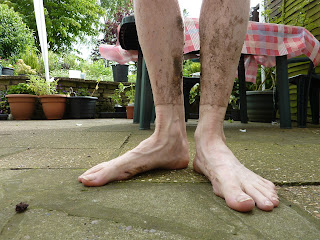A really interesting question is about why it takes such a long time to get fit. On hearing this question, it got me thinking. It all follows - and you may have noticed this as well - with the Olympic Games taking place rightnow and hot on the heels of the Tour de France - there are many more people out running and cycling nowadays. That cheers and encourages me.
And so to the question in hand. Why does it take such a long time? For the answer, in lay terms, it must be considered how a start from zero will see a number of changes taking place. It is important to think of the body as dealing with these situations and it simply takes time and in any event, it is age related to a point. I'm answering the question from the perspective of being a cyclist and a runner.
So. So what are the changes taking place? This is what I noticed in myself:
Muscles
When we exercise we put our muscles under a bit of pressure and the degree of pressure depends directly on the level of existing fitness and the demands placed on them. Go too far and your muscles will ache, possibly for a few days and will probably have some microscopic tears. It does take time to build strength and resilience; this applies to body building mass and strength along with muscles which move quickly and for long periods of time. The trick with muscles, also helpfully applying to tendons and ligaments, is to take time and listen to your body for signs of injury..
Tendons and ligaments
The connecting pieces from a muscle to a bone. Going too far or having minor mishaps can cause an injury which is painful and can last a long time. Stretching helps but only if done the right way and in my book this applies to a muslce which is warm and "limbered" up. Doing short, severe stretches with cold muscles is asking for trouble.
I think running over rough ground is brilliant for strengthening those tendons and ligaments around your feet and ankles. This has a benefit of building strength in a way that will make you less susceptible to getting a sprained ankle. My advice is to take care, avoid injuring yourself by trying to avoid future injuries.
I think running over rough ground is brilliant for strengthening those tendons and ligaments around your feet and ankles. This has a benefit of building strength in a way that will make you less susceptible to getting a sprained ankle. My advice is to take care, avoid injuring yourself by trying to avoid future injuries.
Bones
Running in particular puts a strain on our bones - from our lower spine downwards. Pounding on hard surfaces is placing the bones under some pressure may cause microscopic fractures which are only temporary. Each time we rest and recover afterwards or even perhaps sleeping well, our body's are busy repairing themselves and rebuilding the bones so they are a little stronger.Building up strength and bone density will pay real iin later life in avoiding osteoporois, especially useful for women to know.
As for how long, that's harder. How long is a piece of string? Perhaps allow two or three months.
Aerobic capacity
Your aerobic capacity is about your ability to breath, get oxygen into your blood and get it pumped around your body to make your muscles work. When you're working hard and getting out of breath, that in principle is a good thing to do for most people. Indeed the Government want us all to do this a few times each week. It is also a time when calories and fat get burnt up, although it is said you don't start burning significant amounts of fat until you've been exercising for about an hour.
Cycling and running are brilliant ways of getting a dose of aerobic exercise.
Other changes
Amongst the many other things going on, some of these might become apparent:
- You might look different: slimmer and "brighter". Your friends or family might say you appear younger and more dynamic. Having said that, I don't recall anyone ever referring to me as being dynamic...
- You might get addicted to your new sport: you might find yourself thinking about it much of the time (where, when to go for your next run or cycle, what to buy next, what event to enter, what blog to read or perhaps write, and so on). You might experience the Runner's High
- Your whole life style might change. You might find yourself socialising differently or with different people as you use your spare time differently.
- Your outlook on life may change and you won't want to go back to how you were



No comments:
Post a Comment